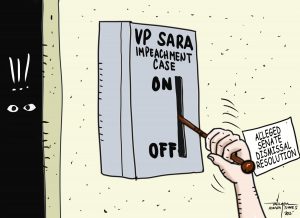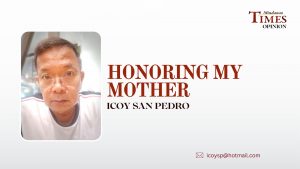MAYOR Sara Duterte and the Datu Bago Awardees Organization, Inc., chaired by Councilor Pilar Braga, will confer today the Datu Bago Awardees 2020. This is the first time in 51 years that the conferment will be done through a virtual platform.
The Datu Bago Award is the highest award given by the city to its exemplary citizens who have helped in the growth and development of the city in whatever field they excelled in. Since all activities in last year’s Araw ng Dabaw, the founding anniversary of the city, was put on hold, the officers of the DBAO, Inc, decided to push through with the conferment this month.
Hosted by Mary Ann Montemayor (Datu Bago Awardee 2019), the awarding ceremony will highlight the contribution of the awardees.
The Datu Bago Awardees 2020
TITA A. LACAMBRA-AYALA
(Posthumous)
An Ilocana who made Davao City her home, she was a multi-awarded poet, author, publisher, and visual artist whose legacy continues to benefit Davao art and artists beyond her lifetime.
Fondly referred to as the “Mother of Davao Literature,” she did not just produce many outstanding literary works, she also gave birth to the ethos of generosity in recognizing and inspiring young artists from Davao and the entire Mindanao region.
She created a revolutionary platform for Davao artists through the legendary “Road Map” series that brought their art to a wider community and paved the way for Davao City to be recognized as a major literary and cultural hub in the Philippines.
She co-founded the Davao Writers Guild, the city’s main literary organization, and served as a long-standing editor of the Davao Harvest series, a literary anthology that features Mindanao writers.
Without a doubt, her immense contribution to the growth and development of Davao City’s culture and arts has helped shape the Davaoeño spirit of diversity, generosity, community, and creativity.
SUSAN P. CARIAGA
An outstanding Davaoeña lawyer whose legacy is beyond the legal profession, she is being recognized for her innovative approach to education which is to teach where the learners are and whatever their circumstances in life may be.
Having experienced first hand the inequities in our legal system as a practicing lawyer, she developed a strategic intervention that responds to the needs of young people in jail whose formal education had been disrupted.
Through the innovative “College Education Behind Bars” program at the Davao City Jail that she initiated and implemented, she not only helped youth detainees continue their formal education while waiting for their cases to be resolved, she also integrated spiritual development and character transformation into the program to make them better citizens for nation-building.
This trailblazing education program, which is now being adopted by the Davao Penal Farm, has made Davao City a model for the rest of the country.
Her advocacy of promoting spiritual transformation as the key to a liberating education and meaningful life has made an impact on countless at-risk and vulnerable youth who now have a second chance in life.
ANDRY K. LIM
A self-confessed “accidental farmer,” he is a tireless advocate of natural farming and sustainable agriculture and helped Davao City adopt organic food production as a policy and priority.
He helped set up countless organic farms in the city and organized a thriving network of organic and natural farmers. His efforts to raise awareness on the importance of nutritious, safe, and affordable farm produce nurtured a culture of healthy living among Davaoeños.
His passion for natural farming connected him to the indigenous peoples of Davao, notably the Ata and Matigsalug tribes, and his experience with them profoundly changed him. It inspired him to establish the Tribal Mission Philippines, Inc., which later became the Tribal Mission Foundation International, Inc.
For over four decades, his mission that started with relief work that helped provide for the basic needs of the tribes evolved into building their capacities to develop their own communities and make them self-sufficient.
His work with Davao’s indigenous communities deepened his knowledge in natural farming and strengthened his resolve that the health of the city and its people would greatly depend on how we produce and consume the food we eat.
ARTURO M. MILAN
Born and raised in and dedicated his life to Davao City, he embodies the humble, unassuming, hardworking, and trailblazing Davaoeño business leader with a heart.
Having honed his professional skills with two of the biggest business institutions in the city, he uses his vast network of human and material resources to serve those in the margins of society through the Our Lady of Victory Training Center, Inc., the Gawad Kalinga Community Development Foundation, Inc., and the Philippine Red Cross Davao City Chapter.
A respected and beloved private sector leader, he rallied the local business community to remain undaunted by the Marial Law declaration in Mindanao and continued to assure domestic and foreign investors that Davao City remains open for business and has maintained its competitive edge.
As a leader of the Davao City Chamber of Commerce and Industry, he championed micro and small entrepreneurs and created an empowering platform for young entrepreneurs by nurturing the Davao City Young Entrepreneurs Association.
A valued private sector partner of the city government, he inspires many Davaoeño entrepreneurs to invest in their own city not just by doing business here but by helping and meaningfully creating opportunities for the disadvantaged and the vulnerable sectors of their community.
RENATO B. LUMAWAG
(Posthumous)
Considered an institution in the Davao media community, he is recognized for his significant contribution in chronicling Davao and Mindanao history and telling the stories of its diverse communities and peoples through his photographs.
An artist and a photojournalist, his unique eye that always captured the essence of an event, a person, a place, and a certain time connected people to his subjects through his photographs. His technical skills honed through years of continuous learning and his natural gift for storytelling merged together to produce images that moved and shaped the people on the streets as well as policy-makers and thought leaders.
He documented the journey of Davao City from being the “killing fields of Asia” to becoming “one of the most livable cities in Asia” and parallel to that was the rise of its city mayor from a prosecutor to the 16th President of the Republic of the Philippines.
Considered the father of the Camera Club of Davao, he mentored many young photographers and instilled in them the Davaoeño spirit of generosity, integrity, and community.
Because of his legacy, generations of Davaoeños will have a window where they can view the city’s history to better understand and embrace their cultural heritage and identity.
RUBEN G. ROBILLO
A true doctor for the people, he does not only apply his surgical skills on his human patients, he also uses them to critically analyze and respond to social problems.
Fresh from surgical training, he responded to the needs of a city that was then known as the killing fields by building a community hospital to serve the remote districts of Calinan and Marilog, the first in that part of the city.
He also co-founded the first cooperative hospital in the Philippines, the Medical Mission Group Hospital Health Services Cooperative. Its mission was to provide fast, expert, and affordable surgical procedures to patients who could not afford the high fees of private hospitals and help decongest surgical wards of government hospitals so they can serve truly indigent patients.
His special focus on serving indigenous children and children with special needs as well as the elderly — has made him a valuable partner of the city government in caring for the most vulnerable groups in the city.
LEONCIO P. VILLA-ABRILLE
A lawyer who is better known for his outstanding leadership in several civic organizations and his humanitarian work, he is being recognized for his significant contribution to the city’s urban shelter program for informal settlers and his philanthropy that made the establishment of various churches, schools, and community centers in Davao City possible.
A member of one of the pioneering Filipino-Chinese families in the city, he is responsible for making sure their family’s vast land holdings and prime real estate properties are used in the service of Davao City’s growth and development.
He is a key figure in the development of the Davao City Chinatown, one of the largest Chinatowns in the world in terms of land area, that promotes the city’s rich Chinese heritage and harnesses the contribution of Davaoeño-Chinese entrepreneurs to the city’s economy.
A progressive and reform-oriented civic leader, he instilled a culture of philanthropy in Rotary, Jaycees, and Ambassador organizations and maximized resources for innovative programs and projects by reducing administrative expenses.
A pillar of the YMCA, he is a champion for youth leadership and has mentored, through his various scholarship programs and youth camps, countless disadvantaged young Davaoeños who would not have had a chance to develop themselves without his help.



